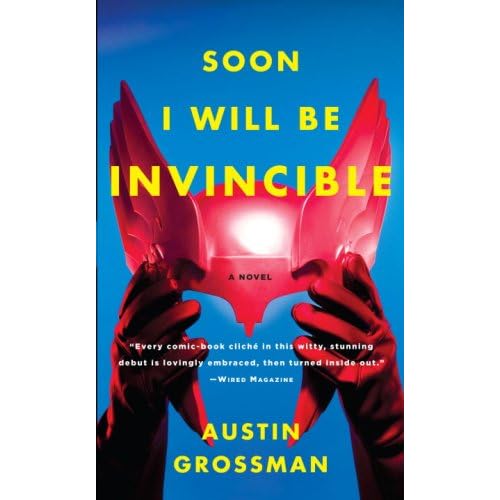Grossman's take on the whole thing is centered on Dr. Impossible, a beat-up-as-a-kid, misunderstood-genius, superiority-complex/inferiority-complex supervillain...the characters are all familiar, but vaguely familiar. Grossman has done a bang-up job of creating a parallel superhero-infested universe to D.C. and Marvel's trademarked and copyrighted realms.
Anyway, putting it down I was reminded of a pretty much universal theme of modern fiction, how we are all alone. Alienation. Overindividuation. Separation. And so on. It's honestly been a while since I even thought much about it. It's old hat, this alienation thing. It's so, like, 1960.
But, ya know, just be cause it's a cliché doesn't mean it isn't true. Superheroes, or Wicked's witch, just weren't on the cultural radar when Baum's original Wizard of Oz came out. Not that people weren't desperately lonely 100 years ago, but as a cultural theme, it kind of took World War I and the Lost Generation to make alienation interesting. Or normal.
It feels to me like there's a bunch of themes I've been carrying around for long time, some of them for decades even, that come together oddly in the Grossman novel. It's odd to me because, honestly, I've never gotten the appeal of superhero comics. I'm an arty-comic kind of person. Neil Gaiman all the way.
- DIY alienation: I think I've mentioned this before on the blog, how it drives me crazy when people figure they have to "do it themselves" if they are to feel justified in the world. People make fun of Academy Award winners who go on and on thanking everyone, but really they're being realistic. No-one does it alone, and anyone who starts to believe the publicity saying he or she does, is setting themselves for a repeat of Lightning McQueen's situation in Cars. But, of course, we are set up to look at single operators. Soloists are heroes, orchestras are like cabals or gangs. Superheroes are like that false value, magnified.
- Alienation and scale: Superheroes are urban. So are most of us who read this kind of blog-stuff. We have a peer group made up of people "like us" in some respect, rather than family or neighborhood. I know my neighbors, but not well. We don't hang out. My family lives in Maine and New Jersey; my wife's in Colorado and Utah. You get a different story when the characters all have lived in the same town for a long time (you get Garrison Keillor or Louise Erdrich), or if family is what they know and do mainly. And even these non-urban writers can't help but write from a viewpoint where most of the world is urban.
- Alienation, science and universalism: Look, what I'm seeing from where I sit is: there are people for whom God is a person. An all-knowing, all-powerful person, like superheroes are imitations of. And there are others (I'm on this side of the argument), for whom God, or the idea of God, is a map-maker, looking down equally at all points. This point of view does not lend itself to a cozy relationship to the divine, because it includes necessarily the idea that God didn't choose you; you aren't on the "cool" side of God's red velvet rope, because there is no rope. God doesn't choose anyone.
Stray bit: In looking at others' comments tot he book, I really like burritoboy's notes on supervillians as stand-ins for Hitler. Makes a ton of sense; as in so many things, most of the second half of the 20th century is backwash from The War.


No comments:
Post a Comment